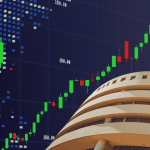On Friday, July 4, the Nifty 50 and Sensex are expected to open on a positive note, driven by positive close on Wall Street.
As of 7:25 AM, the GIFT Nifty was trading near the 25,529 mark, up 34 points from its previous close, indicating that the Indian market is likely to catch up with the record-breaking bullish moves of the S&P 500 and the Nasdaq Composite.
Asian markets traded mixed on Friday, as investor caution grew due to looming trade tensions ahead of next week’s deadline for increased tariffs, which offset the momentum from Wall Street's ongoing record-setting rally.
Regarding institutional flow, the DIIs in Indian equities have remained net buyers for the past 4 trading sessions, while FIIs remained net sellers for the last 4 trading sessions.
On Thursday, July 3, Foreign Institutional Investors (FIIs) were net sellers, having sold equities worth ₹1,481.19 crore. Domestic Institutional Investors (DIIs), on the other hand, bought shares totalling ₹1,333.06 crore during the same session.
Indian stock markets ended slightly lower on Thursday, as persistent profit booking in financial stocks weighed on investor sentiment, despite positive cues from easing global trade tensions. The Nifty 50 declined by 0.19% to close at 25,405.3, while the BSE Sensex slipped 0.2% to settle at 83,239.47. Both indices had climbed nearly 0.5% during the session before reversing gains.
Asian markets showed a mixed performance as investor sentiment was caught between upbeat U.S. jobs data and fresh concerns over potential tariff actions by President Trump. While U.S. stocks had touched record highs ahead of the Independence Day holiday, renewed trade threats introduced fresh uncertainty.
Wall Street ended Thursday on a strong note with all major indexes closing higher, driven by a rally in tech stocks, particularly Nvidia, which inched closer to a $4 trillion market valuation. Investor sentiment remained positive following a robust U.S. jobs report. The robust June jobs data is helping ease concerns over a potential economic slowdown in the U.S.
The S&P 500 and Nasdaq Composite both ended at all-time highs, marking their third consecutive weekly gain. The Dow Jones Industrial Average also advanced, ending just 0.41% short of its peak. Specifically, the S&P 500 rose 51.94 points (0.83%) to finish at 6,279.36, the Nasdaq climbed 207.97 points (1.02%) to 20,601.10, and the Dow added 344.11 points (0.77%) to settle at 44,828.53.
The US House of Representatives has passed President Donald Trump’s expansive tax and spending package, dubbed the “One Big Beautiful Bill,” with a narrow 218–214 vote. The legislation makes permanent the 2017 tax cuts, introduces fresh tax incentives, and allocates funding for stricter immigration measures. According to the Congressional Budget Office, the bill will raise the national debt by $3.4 trillion, pushing the total beyond $36.2 trillion.
Nvidia shares surged to a record high, closing at $159.34 — a gain of 1.33% — elevating its market capitalisation to $3.89 trillion. This milestone places the chipmaker ahead of tech giants Apple and Microsoft, bringing it close to the $4 trillion mark and crowning it as the most valuable company globally.
Nonfarm payrolls rose by 1,47,000 in June, exceeding economists' forecast of 1,10,000. May’s job growth was revised up to 1,44,000 from the earlier estimate of 1,39,000. The U.S. unemployment rate edged down to 4.1% in June from 4.2% in May, partly due to a shrinking labor force. Initial unemployment claims dropped by 4,000 to 233,000 for the week ending June 28 — the lowest since mid-May.
Gold rose 0.2% to $3,330.85/oz in early Asian trade, supported by U.S. fiscal-deficit concerns. The House passed President Trump’s tax and spending bill, with analysts projecting the U.S. budget deficit to remain near 6% of GDP in the coming ye
Brent crude oil futures edged up to $68.7 per barre and WTI crude oil futures edged up to $67 per barrel on Friday after the US took fresh steps to restrict the trade of Iranian oil, ratcheting up pressure on Tehran
Disclaimer: The article is for informational purposes only and not investment advice.

Hindalco Share Price Crashes 6% as Nifty Metal Falls 3%
3 min Read Feb 13, 2026
BSE Share Price Surges 74% in 1 Year; 5-Year Return 4500%
3 min Read Feb 13, 2026
Kilitch Drugs Bonus Shares 1:1, Q3 Results, Share Price
3 min Read Feb 13, 2026
Railway Stock in Focus: MIC Electronics Wins Railway Orders Worth ₹5.91 Crore This Week
3 min Read Feb 13, 2026
HAL Share Price in Focus After ₹2,312 Crore Contract Signed for 8 Dornier Aircraft
3 min Read Feb 13, 2026